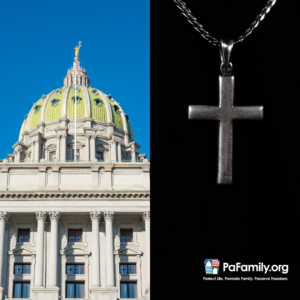By: Randy Wenger (Published in The Morning Call on August 6)
Attorney General Kathleen Kane’s decision to forgo defending Pennsylvania’s Defense of Marriage Act has undermined the rule of law in Pennsylvania.
There are plenty of political issues across Pennsylvania and our country about which citizens vigorously disagree: the proper size and scope of the state budget; voter ID regulations; the privatization of retail liquor sales; the definition of marriage. These are just a few of the contentious issues that divide us.
What unites us, however, as Pennsylvanians and as Americans is a commitment to the process by which these political disputes are resolved. Regardless of what side of a controversy we’re on, there is solace in the rule of law — the concept that we are all playing by the same rules, and that those rules will not be arbitrarily changed to fit personal or political agendas.
We submit ourselves to this rule of law, and we expect our elected officials to submit themselves to it. This is a fundamental principle of the American republic. Nothing undermines political comity and stability more than when the rule of law is seen as contingent on the whims of politicians.
And yet this state of instability is exactly where we find ourselves in Pennsylvania due to Kane’s abandonment of our commonwealth’s overwhelmingly approved Defense of Marriage Act. Her actions beg the question: Which Pennsylvania laws are actually laws, and which are just suggestions? Only Kathleen Kane knows.
This is not idle speculation. It is not a coincidence that within weeks of Kane’s announcement that Montgomery County Register of Wills D. Bruce Hanes decided to publicly flout state law by distributing marriage licenses to same-sex couples. In casting doubt on the validity of a duly-enacted law without actually going through the prescribed legal process to invalidate it, Kane has opened up space for Hanes or any local executive official to write his or her preferences into the law.
What if, should marriage be redefined in Pennsylvania, a county official were to deny a same-sex couple a marriage license because of his view of what marriage ought to be? If each executor of the law may decide for himself what the law ought to be, on what ground could same-sex marriage activists complain (as they surely would)?
In Kathleen Kane’s Pennsylvania, how do executive officials, absent a respect for the rule of law, determine when to enforce the law and when to ignore it? In an article in the Legal Intelligencer of Philadelphia, analyst G. Terry Madonna of the Center for Politics and Public Affairs at Franklin & Marshall College put Kane’s calculus this way: “If she had chosen to push ahead and defend the statute, she would have had serious problems with the Democrats.”
Are our laws enforceable only inasmuch as it is politically advantageous for the attorney general to enforce them? Already special interests are lining up to lobby Kane to ignore laws they don’t like. An assisted-suicide advocacy organization recently announced that it is pressuring Kane to ignore state law and to abandon an ongoing prosecution. If the rule of law doesn’t matter, what reason is there for Kane not to side with this organization against Pennsylvania law, if she were to discern it to be politically advantageous?
When John Adams wrote in the Massachusetts Constitution that “to the end it may be a government of laws and not of men,” it was in the context of the very brief Article XXX, which strictly laid out the separation of powers in state government. Adams saw clearly that if public servants begin exercising powers not delegated to them, we become beholden not to the stability and order of law, but to the whim and ambition of politicians.
It is this separation of powers that Gov. Tom Corbett referenced when he said last week in the Pittsburgh Post-Gazette: “The law is clear in Pennsylvania, that marriage is between a man and a woman. … [The Legislature has] has not changed it, nor have the courts of Pennsylvania changed it.”
It is not the role of the executive branch or local official to change it. Therefore we should applaud the governor for taking legal action to enforce this law.
No matter where one stands on the question of the definition of the marriage, we can all agree that the rule of law is more stable, more just and more American than the rule of politicians.
Randall Wenger is chief counsel for the Pennsylvania Family Institute in Harrisburg.




There is an alternate explanation for Attorney General Kane’s action. She looked at the ban on same-sex marriage in Pennsylvania. She also looked at the 14th Amendment of the U.S. Constitution. She probably looked at the U.S. Supreme Court’s recent ruling on the Defense of Marriage Act. She concluded that the PA law was hopelessly unconstitutional. Because of her oath of office to defend the U.S. Constitution, she refused to defend the state law. To do otherwise would cause her to violate her oath of office and violate the U.S. Constitution.
Please consider trying to present all sides to issues in the future.